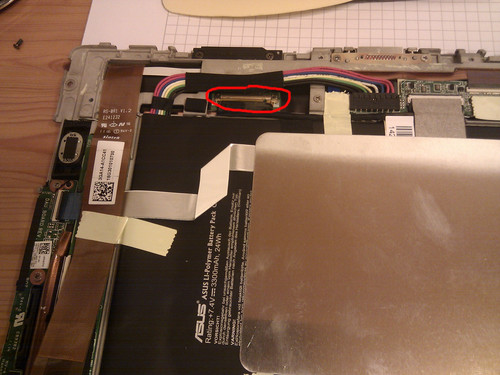2013 posts
My ASUS Transformer TF101 had suddenly started flickering in all sorts of funny colors some weeks ago. As tapping it gently on the table in the right angle made the problem go away temporarily, it was clear the problem was about a loose cable, or some other hardware connection issue.
As I needed to go on a business trip the other day, I didn't look up the warranty expiration day until later that week. Then, Murphy struck: the tablet was now 2 years + 1 day old! Calling ASUS, some friendly guy there suggested I still tried to get ASUS to accept it for warranty, because the tablet had been with them last year for 5 days, so if they added that, it would still be within the warranty period. I filled out the RMA form, but one hour later the reply was they rejected it because it was out of warranty. Another guy on the phone then said they would probably only do the adding if it had been with them for maybe 10 days, or actually really 30 days, or whatever.
Some googling suggested that the loose cable theory was indeed worth a try, so I took it apart. Thanks to a forum post I could then locate the display connector and fix it.
Putting the case back together was actually harder than disassembling it because some plastic bits got stuck, but now everything is back to normal.

If you are upgrading your HP/Compaq 6715b to Debian Jessie, and suddenly Wifi stops working because the PCI device is gone, install the "rfkill" package:
# lspci | tail -2
02:04.1 FireWire (IEEE 1394): Ricoh Co Ltd R5C832 IEEE 1394 Controller (rev 02)
10:00.0 Ethernet controller: Broadcom Corporation NetLink BCM5787M Gigabit Ethernet PCI Express (rev 02)
# rfkill list 1
1: hp-wifi: Wireless LAN
Soft blocked: yes
Hard blocked: no
# rfkill unblock wifi
# rfkill list 1
1: hp-wifi: Wireless LAN
Soft blocked: no
Hard blocked: no
# lspci | tail -2
10:00.0 Ethernet controller: Broadcom Corporation NetLink BCM5787M Gigabit Ethernet PCI Express (rev 02)
30:00.0 Network controller: Broadcom Corporation BCM4311 802.11a/b/g (rev 02)
Reports on the internet say that the same could be done by going into the BIOS and selecting "Reset to default" - this makes the Wifi LED active until about udev is started on the next boot.
To be done: figure out how to automate this.
Following an idea by Ansgar Burchardt, I've done some digging on version numbers in Debian:
Most common version numbers:
projectb=> select version::text, count(*) from source group by 1 order by 2 desc; version | count ------------+------- 4:4.10.5-1 | 131 1.0-1 | 120 1.0.0-1 | 95 1.1-1 | 95 1.0.1-1 | 93 1.2-1 | 88 1.0-2 | 82 0.2-1 | 80 0.3-1 | 79 0.5-1 | 77 0.04-1 | 76 1.1.1-1 | 76 0.10-1 | 74 1.4-1 | 72 1.1-2 | 71 0.1-1 | 70 0.11-1 | 70
Version number with the most spellings: (considered equal by the dpkg definition, implemented in the "debversion" type)
projectb=> select version::text, count(*) from source where version = '1.02-1' group by 1 order by 2 desc; version | count ------------+------- 1.2-1 | 88 1.02-1 | 46 1.002-1 | 4 1.000002-1 | 1 001.002-1 | 1 1.00002-1 | 1
If we look at equivalent version numbers, the first table above looks entirely different:
projectb=> select version, count(*) from source group by 1 order by 2 desc limit 30; version | count ------------+------- 0.3-1 | 162 1.0-1 | 160 0.05-1 | 156 0.04-1 | 154 0.02-1 | 151 1.02-1 | 141 0.006-1 | 133 1.001-1 | 131 4:4.10.5-1 | 131 0.7-1 | 127
(I'm also participating in the "longest version number" contest, I've just uploaded bind9 version 1:9.8.4.dfsg.P1-6+nmu2+deb7u1~bpo60+1 to backports.)
We were lazy and wrote a simple PostgreSQL monitoring check in shell instead of using some proper language. The code looked about this:
out=$(psql -tAc "SELECT some_stuff, t > now() - '1 day'::interval FROM some_table" some_db 2>&1)
case $out in
*t) echo "OK: $out" ;;
*) echo "NOT OK: $out" ;;
esac
If the string ends with 't', all is well, if it ends with 'f' or someting else, something is wrong.
Unfortunately, this didn't go that well:
OK: psql: FATAL: database "some_db" does not exist
We've just put the new PostgreSQL minor releases live on apt.postgresql.org. Building 5 major versions for 10 distributions produces quite a lot of stuff:
- 25 .dsc files (source packages)
- 745 .deb files (360 *_amd64.deb + 360 *_i386.deb + 25 *_all.deb)
- 497 MB in *_amd64.deb files
- 488 MB in *_i386.deb files
- 58 MB in *_all.deb files
- 73 MB in *.orig.tar.bz2 files
- in total 1118 MB
Compiling took a bit more than 10 hours on a 2-cpu VM. Of course that includes running regression tests and the postgresql-common testsuite.
Note: This will be the last update published on pgapt.debian.net. Please update your sources.list entries to point to apt.postgresql.org!